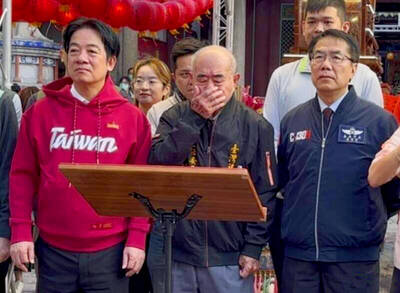An environmental protection group yesterday said that Kinmen County could become overly dependent on China after the county signed a landmark water agreement with Chinese authorities on Monday.
Purchasing water from China means that Beijing would have increased control over the region, Taiwan Water Resources Protection Union director Jennifer Nien (粘麗玉) said, adding that Beijing could use the deal to coerce Kinmen into submitting to its demands by severing water supplies or increasing prices.
She urged the Kinmen County Government to build seawater desalination plants, preserve its groundwater reserves and carry out regular reservoir dredging work so that the county can retain a degree of water sovereignty in the event of a worst-case scenario.
Under Monday’s agreement, China is to deliver 15,000 tonnes of water per day to Kinmen, with the amount gradually increasing over time to 34,000 tonnes per day starting from the 10th year of the arrangement.
The pact also poses a risk to Kinmen’s environment and quality of life, Nien said, citing concerns over the construction of an underwater pipeline connecting China’s Fujian Province and Kinmen, which is scheduled to be completed by the end of 2017.
The quality of the water from China is also questionable, as water in Chinese reservoirs often contains high concentrations of impurities, she said.
“People in many Chinese provinces do not bother to boil tap water. Instead they use water dispensers and buy drinking water from private firms,” she said.
Citing Chinese Nationalist Party (KMT) Legislator Yang Ying-hsiung’s (楊應雄) pledge to push for Kinmen to be allowed to purchase electricity from China as well, Nien said that if utilities on Kinmen come under Beijing’s control, it would bring Kinmen closer to China and compromise its status as Taiwan’s military outpost.

A New York-based NGO has launched a global initiative to rename the nation’s overseas missions, most of which operate under the name "Taipei," to "Taiwan Representative Office (TRO)," according to a news release. Ming Chiang (江明信), CEO of Hello Taiwan, announced the campaign at a news conference in Berlin on Monday, coinciding with the World Forum held from Monday through Wednesday, the institution stated in the release. Speaking at the event, Democratic Progressive Party Legislator Huang Jie (黃捷) said she believed this renaming campaign would enable the international community to see Taiwan

DEFENSE: The US should cancel the US visas or green cards of relatives of KMT and TPP lawmakers who have been blocking the budget, Grant Newsham said A retired US Marine Corps officer has suggested canceling the US green cards and visas of relatives of opposition Taiwanese lawmakers who have been stalling the review of a proposed NT$1.25 trillion (US$39.7 billion) special defense budget. The Executive Yuan has proposed the budget for major weapons purchases over eight years, from this year to 2033. However, opposition lawmakers have refused to review the proposal, demanding that President William Lai (賴清德) first appear before the Legislative Yuan to answer questions about the proposed budget. On Thursday last week, 37 bipartisan US lawmakers sent a letter to Legislative Speaker Han Kuo-yu (韓國瑜), the heads

TOO DANGEROUS: The families agreed to suspend crewed recovery efforts that could put rescuers in danger from volcanic gases and unstable terrain The bodies of two Taiwanese tourists and a Japanese pilot have been located inside a volcanic crater, Japanese authorities said yesterday, nearly a month after a sightseeing helicopter crashed during a flight over southwestern Japan. Drone footage taken at the site showed three bodies near the wreckage of the aircraft inside a crater on Mount Aso in Kumamoto Prefecture, police and fire officials said. The helicopter went missing on Jan. 20 and was later found on a steep slope inside the Nakadake No. 1 Crater, about 50m below the rim. Authorities said that conditions at the site made survival highly unlikely, and ruled

HYGIENE: People should wash their hands before eating or preparing food, and clean contaminated surfaces with a diluted bleach solution, the CDC said More than 7,500 people sought medical attention for diarrhea during the first three days of the Lunar New Year holiday, the Centers for Disease Control (CDC) said yesterday, adding that nearly 90 percent of the cluster diarrhea outbreaks were caused by norovirus. Norovirus-triggered symptoms drew public attention when a temple manager in Tainan on Wednesday threw up during President William Lai’s (賴清德) visit, with part of the vomit landing on Lai’s left shoulder and arm. The temple manager later said he had contracted norovirus from family members. Hospitals reported 7,581 visits due to diarrhea on the first three days of the Lunar New